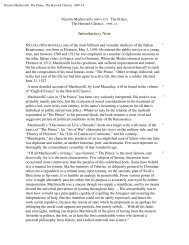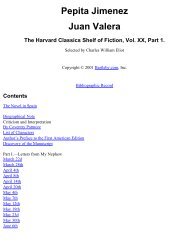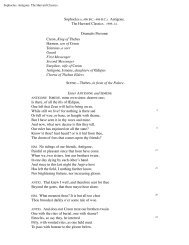Notre Dame de Paris - Bartleby.com
Notre Dame de Paris - Bartleby.com
Notre Dame de Paris - Bartleby.com
You also want an ePaper? Increase the reach of your titles
YUMPU automatically turns print PDFs into web optimized ePapers that Google loves.
pupil, docile, studious, and honourable. But the younger brother, like those young trees which baffle the<br />
efforts of the gar<strong>de</strong>ner, and turn obstinately towards that si<strong>de</strong> from which they <strong>de</strong>rive most air and<br />
sunshine—the younger brother increased and waxed great, and sent forth full and luxuriant branches only<br />
on the si<strong>de</strong> of idleness, ignorance, and loose living. He was an unruly little <strong>de</strong>vil, which ma<strong>de</strong> Dom<br />
Clau<strong>de</strong> Knit his brows, but also very droll and very cunning, at which the el<strong>de</strong>r was fain to smile. Clau<strong>de</strong><br />
had consigned him to that same Collége <strong>de</strong> Torchi in which he himself had passed his earliest years in<br />
study and seclusion; and it grieved him sorely that this retreat, once edified by the name of Frollo, should<br />
be so scandalized by it now. He would sometimes read Jehan long and stern lectures on the subject,<br />
un<strong>de</strong>r which the latter bore up courageously—after all, the young rascal’s heart was in the right place, as<br />
all the <strong>com</strong>edies <strong>de</strong>clare; but the sermon over, he calmly resumed the evil tenor of his ways. Some times<br />
it was a béjaune, or yellow-beak, as they called the new<strong>com</strong>ers at the University—whom he had<br />
thoroughly badgered as a wel<strong>com</strong>e—a valuable custom which has been carefully han<strong>de</strong>d down to our<br />
day; now he had been the moving spirit of a band of scholars who had thrown themselves in classical<br />
fashion on a tavern, quasi classico excitati, then beaten the tavern-keeper “with cudgels of offensive<br />
character,” and joyously pillaged the tavern, even to staving in the hogsheads of wine. And the result was<br />
a fine report drawn up in Latin, brought by the sub-monitor of the Torchi College to Dom Clau<strong>de</strong>, with<br />
piteous mien, the which bore the melancholy marginal remark, Rixa; prima causa vinum optimum<br />
potatum. 49 Finally, it was said—horrible in a lad of sixteen—that his backslidings frequently exten<strong>de</strong>d<br />
to the Rue <strong>de</strong> Glatigny. 50<br />
In consequence of all this, Clau<strong>de</strong>—sad<strong>de</strong>ned, his faith in human affection shaken—threw himself with<br />
frenzied ardour into the arms of science, that sister who at least never laughs at you in <strong>de</strong>rision, and who<br />
always repays you, albeit at times in somewhat light coin, for the care you have lavished on her. He<br />
became, therefore, more and more erudite, and, as a natural consequence, more and more rigid as a<br />
priest, less and less cheerful as a man. In each of us there are certain parallels between our mind, our<br />
manners, and our characters which <strong>de</strong>velop in unbroken continuity, and are only shaken by the great<br />
cataclysms of life.<br />
Clau<strong>de</strong> Frollo, having in his youth gone over the entire circle of human knowledge, positive, external,<br />
and lawful, was un<strong>de</strong>r the absolute necessity, unless he was to stop ubi <strong>de</strong>fuit orbis, 51 of going farther<br />
afield in search of food for the insatiable appetite of his mind. The ancient symbol of the serpent biting<br />
its tail is especially appropriate to learning, as Clau<strong>de</strong> Frollo had evi<strong>de</strong>ntly proved. Many trustworthy<br />
persons asserted that, after having exhausted the fas of human knowledge, he had had the temerity to<br />
penetrate into the nefas, had tasted in succession all the apples of the Tree of Knowledge, and, whether<br />
from hunger or disgust, had finished by eating of the forbid<strong>de</strong>n fruit. He had taken his seat by turns, as<br />
the rea<strong>de</strong>r has seen, at the conferences of the theologians at the Sorbonne, at the disputations of the<br />
<strong>de</strong>cretalists near the image of Saint-Martin, at the meetings of the Faculty of Arts near the image of<br />
Saint-Hilary, at the confabulations of the physicians near the bénitier of <strong>Notre</strong> <strong>Dame</strong>, ad cupam<br />
Nostræ-Dominæ all the viands, permitted and approved which those four great kitchens, called the four<br />
Faculties, could prepare and set before the intelligence, he had <strong>de</strong>voured, and satiety had <strong>com</strong>e upon him<br />
before his hunger was appeased. Then he had penetrated farther afield, had dug <strong>de</strong>eper, un<strong>de</strong>rneath all<br />
that finit, material, limited knowledge; he had risked his soul, and had seated himself at that mystic table<br />
of the Alchemists, the Astrologers, the Hermetics of which Averroës, Guillaume <strong>de</strong> <strong>Paris</strong>, and Nicolas<br />
Flamel occupy one end in the Middle Ages, and which reaches back in the East, un<strong>de</strong>r the rays of the<br />
seven-branched candlestick, to Solomon, Pythagoras, and Zoroaster.










